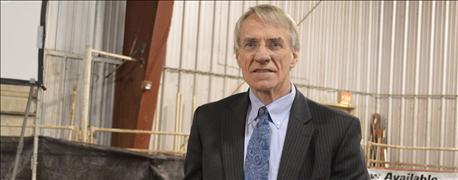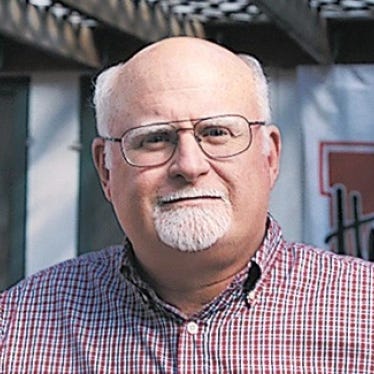
Many of the same conditions that lifted agriculture to new heights from 2007 to 2012 are now combining to deflate it for the years 2016 to 2020. In fact, this "economic reset" has already entered phase one, according to David Kohl, a retired ag economics professor at Virginia Tech University and frequent speaker at ag conferences. "It will be an economic reset, but not a crash," he explained.
Kohl spoke recently at the Nebraska Soybean Day and Machinery Expo in Wahoo.

ECONOMIC RESET: David Kohl, retired ag economics professor at Virginia Tech University, notes many of the same conditions that lifted agriculture to new heights from 2007 to 2012 are now combining to deflate it for the years 2016 to 2020. "It will be an economic reset, but not a crash," he explained.
He described the years 2002 to 2012 as a "great commodity supercycle," one of three such cycles in the United State since 1910. Kohl cited significant growth in the demand by emerging nations for U.S. food, fuel and fiber; the ethanol and biofuels boon; this country's strategy of low interest rates; and the favorable value of the dollar.
But today emerging nations are experiencing moderate to severe declines, with half in recession; a mature biofuels market where ethanol plants near livestock operations may be the only ones profitable; global political dysfunction; softer energy demand and competing sources of energy; and increasing domestic regulations, according to Kohl. Growth in the Chinese economy has dropped considerably, too. "In the grain industry, the easy money from 2007 to 2012 has been made," he said.
"Producers who have not developed and executed risk management plans using forward pricing, options and puts are now experiencing the possibility of negative margins for the first time in years," Kohl predicted.
Kohl also said the winds of economic change could affect land values and cash rents. Year-over-year double-digit land value appreciations could indicate an asset bubble ready to pop. "If land values and cash rents were to decrease, the crosshairs would be in the Midwest and Upper Midwest states more so than in other parts of the country. Instead of buying more land, make your current land more efficient and productive," Kohl recommended.
Kohl stressed the importance of negotiating leases with landlords this winter. "Some landlords are going to get a lot of land back," he predicted.
Weather will play a bigger role, too. "Over the next five years, using weather data in agronomic practices will be more important to your operation. There will be extended periods of drought along with big rainfall events. Keep an eye on not only our weather but also weather in the Southern Hemisphere."
Producers also should be concerned about the recent election in Argentina of Mauricio Macri as president. To ignite the economy, he has urged that country's producers to "plant, plant and plant more soybeans and export them," Kohl said.
Increased banking and lending regulations will tighten credit, he said, so working with your lender will be crucial. "The FED put us on steroids the last few years with artificially low interest rates," Kohl said.
Kohl said the most vulnerable farms are those that include a lot of rented land and haven't saved working capital.
"Of the 2.4 million farms in the United States, 260,000 farms carry 63% of the debt. That means debt is extremely concentrated among the large farms."
The millennial generation, with its changing cultural and social attitudes, must be part of any organization's marketing strategy, including agriculture and its producers, according to Kohl. That generation's food choices, including the consumption of less meat, will affect agriculture. "A disconnect between the general public and agriculture will continue with an even more urbanized nation. This requires the agriculture industry to work together to demonstrate the importance of agriculture to the economy, public and society," he said.
In response to a question from the audience, Kohl warned not to expect any kind of bailout this time around because of the national debt and the mood in Congress against such bailouts.
"The bottom line is that the winds of economic change will increase the importance of management skills as producers navigate the dynamic environment. The importance of forging a strong bond between the producer and lender will be critical as players and stakeholders proactively navigate through the economic turbulence that may be converging on the horizon," Kohl said.
McCabe writes from Lincoln
About the Author(s)
You May Also Like






